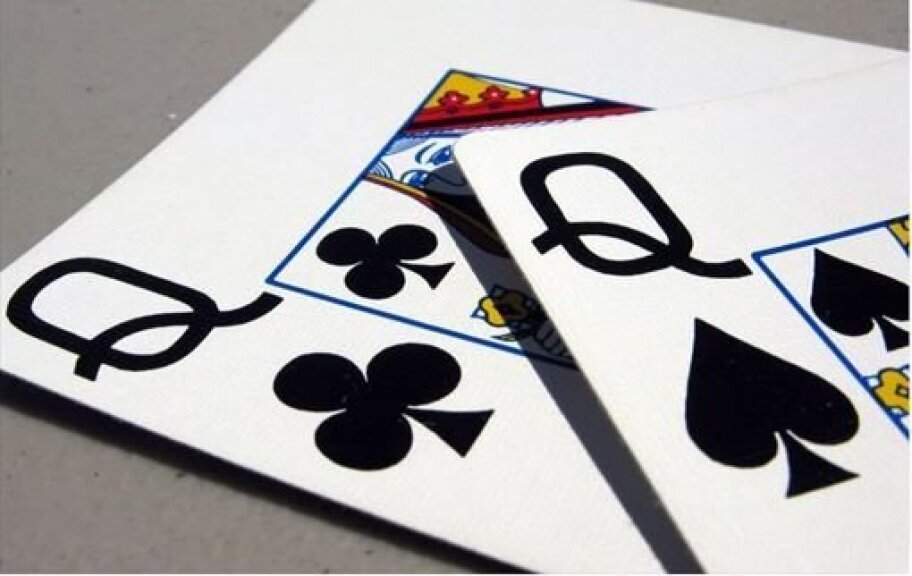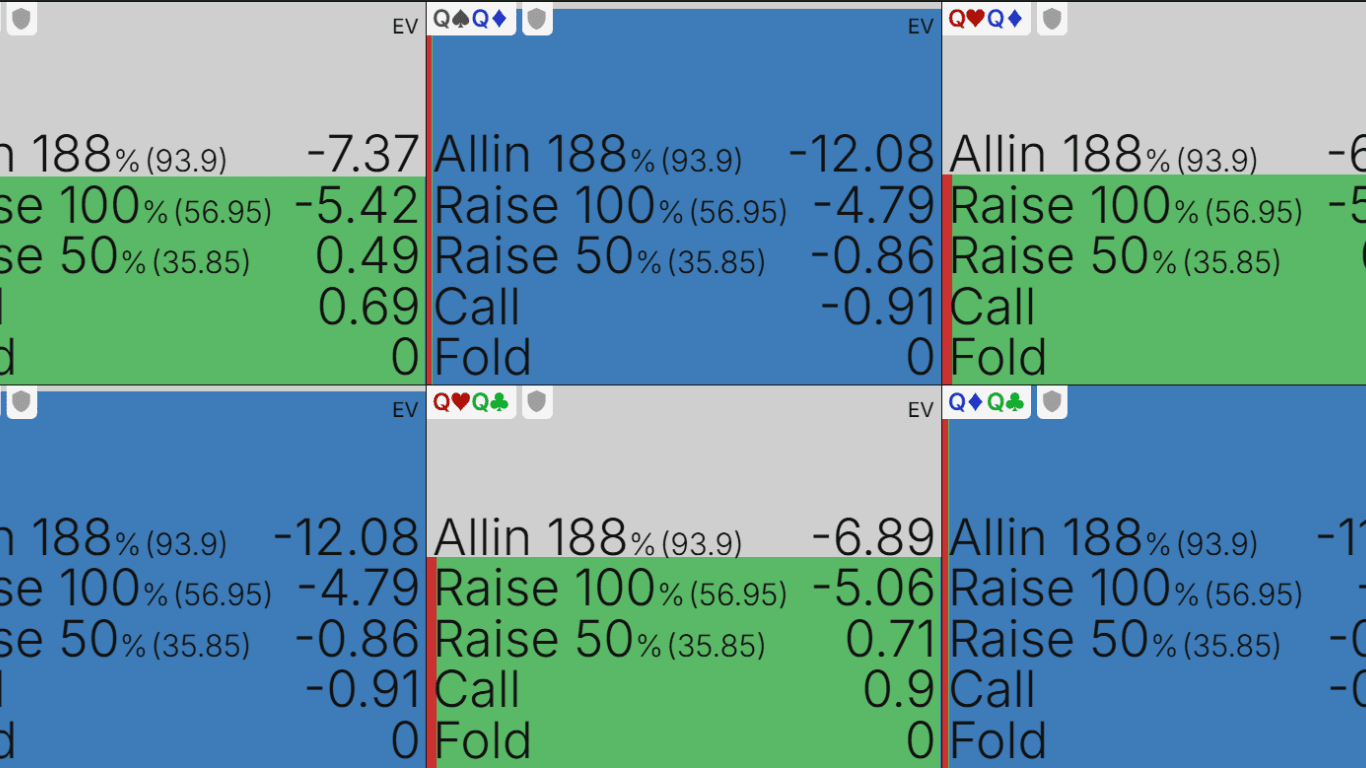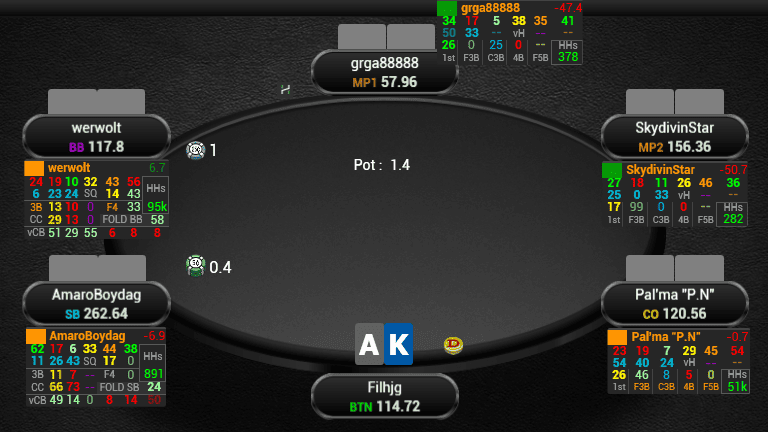Strong holdings preflop often give beginners headaches when facing both preflop and postflop aggression. QQ is not an exception either. We'll look at spots preflop, when to use them aggressively, and if there is a case when we should fold them. Then, we'll examine postflop spots where you could go wrong with your Queens.
When to 3-Bet, 4-Bet, or Call with Pocket Queens (QQ) Preflop
First of all, let's take a look at preflop. There is practically no situation where we don't want to open or 3-bet our pocket QQ since it has such a high EQ against even the tightest opening ranges. Okay, if a recreational player is playing 65/0/0 (VPIP, PFR, 3-bet, respectively) in a significant sample, it's probably okay just to call. But in any other case, you have a powerful holding that is worth piling a lot of money into the pot.
This is also true for cold 4-bet situations. If your opponents use wide enough ranges according to GTO, you should always cold 4-bet your QQ. However, not all 4-bet opportunities are good enough to pull the trigger—spots like tighter range configurations, like opening from UTG and facing a 3-bet from MP. The same is true when you face a 3-bet from UTG. Look for your opponent's stats; if they have such tight 3-betting ranges, then they should have only against UTG; you are probably better off mixing or only calling 3-bets with QQ.
When to Fold Pocket Queens (QQ) Preflop: Rare but Crucial Spots
Folding queens preflop? That sounds like a nightmare. On some infrequent occasions, you should consider folding QQ pre. What spots are most likely that you need to at least think about it? Not surprisingly, when you face very tight ranges. Such as early positions involving a cold 4-bet or exploitatively against a tight player with slight aggression.
Careful, it's not the same you 3-bet or 4-bet against someone who is expected to put all the money in with an extra tiny range and then cry about how unlucky you are that you must fold such a good hand. Think ahead; if your queens cannot take the heat, don't force yourself into a spot where you must fold. It's better to slow down, include QQ in your calling range instead and play the hand postflop.
Slow Playing Pocket Queens (QQ): Smart Strategy or Costly Mistake?
This might be familiar from the previous article about pocket AA, but it's better to reinforce information or examine the same phenomenon from a different viewpoint.
In general, vulnerable hands rarely slowplay. You don't want to donate EV to other players for no reason. Slowplaying preflop with QQ is a big no-no. Two cards (kings and aces) could immediately ruin your action by the flop. In most cases, QQ will be strong enough to play for stacks preflop, but its EQ will decrease dramatically on certain boards or against multiple opponents.
Postflop, there might be some cases in which you want to consider slowplaying your QQ. The main characteristic should be that your hand is nearly invincible. Flopping top set on a dry board is an excellent example of that. However, there must be other factors present to justify slowplaying. For instance, in position, we miss the opportunity to increase the pot. Therefore, the only cases in which you slow down are in low SPR spots, against a broken stack, or in a 3-4-bet spot. Again, when your hand is nearly unbeatable, other factors to justify slowplaying might have to do with your opponent. As an exploit, you want to allow an aggressive player to start attacking your checks. However, sometimes they'll attack small bets, too.
We can conclude that you need a good and justifiable reason to start to slowplay your hand, which almost always includes the fact that you have the nuts, a very strong, invincible hand and/or blocking the calling range.
Adapting to Board Changes: When to Slow Down with Pocket Queens (QQ)
Let's look at a common situation: when the board changes significantly. You need to reevaluate your hand strength (we discussed the term relative hand strength earlier).
Getting dealt a strong hand preflop doesn't mean we are done, and the money will magically flow in our direction. There are plenty of spots where you need to slow down with queens. It could be a disadvantageous flop or a complex runout/action sequence where QQ is decreased significantly in relative hand strength. A classic example of this is having an overpair on the flop, but the turn and river card bring a four to a straight or flush, ruining the EQ of your hand.
Let's see this in practice! You have been dealt ♠Q♦️Q from CO and have decided to open 2,2bb. Only the BB calls, and you have the chance to c-bet 2/3 pot on the ♠J♥T♥2 flop. With your overpair, you have a clear valuebet. The BB calls again, and the turn is the ♥9, one of the worst cards in the deck. How would you approach this spot? Most players would slow down immediately but think about it for a moment. Will you feel more comfortable on any river facing a huge bet? Theory suggests that on EQ equalizer cards, we tend to size down with all of our value hands (and, of course, with bluffs, too). So the question is, can we still valuebet on this turn? And the answer is clearly yes. Villain should continue with top pairs and draws which hands are behind at the moment. Therefore, it's a clear valuebet.
You conclude that you should bet and go for 1/3 pot. BB quickly check-raises 3,5x and it's your turn again.
Without a heart in your hand, you could be drawing dead against Villain value hands. Against her draws, such as ♥A♠Q, ♥A♦T, etc., you are not in good shape, either. Eventually, you decide to fold. Was it a mistake to bet on the turn, then? No, absolutely not. What happened is that the board changed, EQs shifted, and that particular node you ended up with was disadvantageous for your hand. The strength of your queens changed constantly during the hand. This is the thinking process you should approach any spots you face.
Summary
By the end of this article, you see how complex a thought process can be, even though we just scratched the surface with the most common spots that beginners misplay. Preflop, always have a plan. QQ is such a strong hand that, in most cases, you could play for stacks. However, always pay attention to the width of the ranges, and on some rare occasions, even consider folding. Posflop, you need to reevaluate your hand not only after each street but also after each action. Consider relative hand strength and how your entire range would play in that spot. Slowplaying with vulnerable hands is typically not a good idea. You must match various factors, such as an unbeatable hand, a suitable opponent, blocking the calling range, being out of position, etc.
Hopefully, this article will help improve your game when you are dealt QQ!



















0 comments